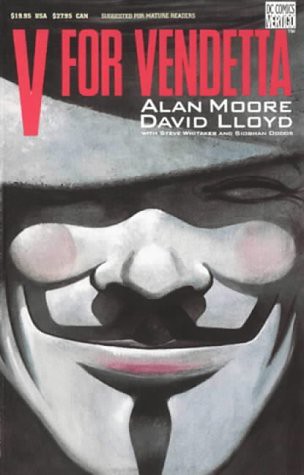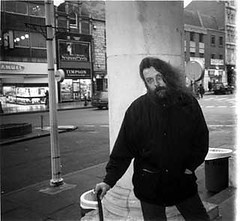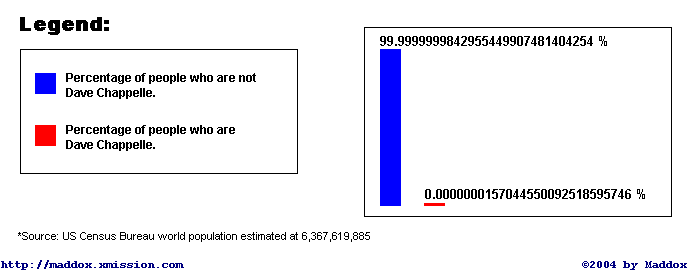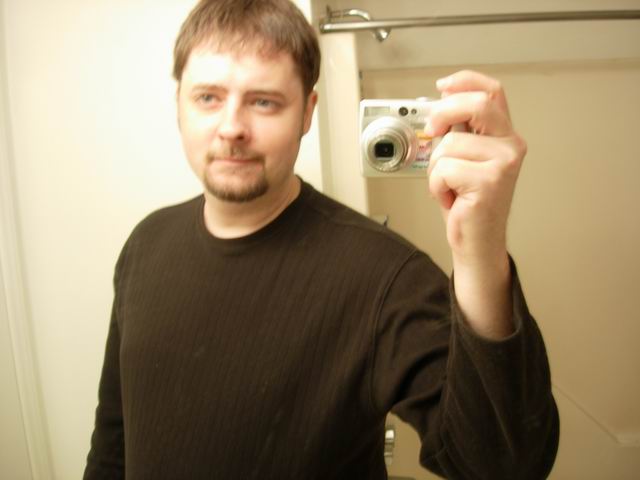V for Vendetta: The Graphic Novel

A couple of months ago I reviewed the movie V for Vendetta and this time around I've decided to review the graphic novel. As I mentioned in my last post, a friend of mine gave me a trade paper back of the graphic novel to replace the actual 10 issues that I had lost during the flooding last month. I decided to reread it over the last couple of days and remembered what a complex and detailed piece of work it really is. The movie itself was very well done but seems really to only be a drop in the bucket of the what the author and illustrator, Alan Moore and David Lloyd, were really trying get across.

Alan Moore, Author

David Lloyd, Artist
This had been a pet project of Moore's that was on the backburner due to his ground breaking work on Swamp Thing and the Eisner award winning The Watchmen for DC comics.The story itself was written over a period of years from 1981 to 1988 under which England had been under Conservative Party rule with Margaret Thatcher. Moore, an anarchist at heart, was fearful of the times due to the cold war, the breakout of HIV/AIDS and a general xenophobic attitude of all things non-english around him. He feared that any extreme form of goverment, whether it be left or right wing politically, might do more to harm their citizens than good in order to keep the reigns of their power tight. This fear was what set the times and events of V for Vendetta. He had the setting...all he really needed was a character, the protaganist to give a reason for the novel.
During those years Moore became disenchanted with DC comics and it's eventual offshoot of Mature Comics/Graphic Novel line called Vertigo. He had been unable to retain his rights or his creative freedom and this felt crushed by DC's strict character and plot guidelines. He began to feel that this company was imprisoning him creatively and eventually financially. Thus it would appear this fight against those who would hold him back probably did more to fuel the creation of V as a character than the setting of the story. At this point he now had the finishing touches to finish, what would be his last official effort with DC comics.
When going from page to screen the movie makers tend to leave out a number of important details that made the original work so well received. However, I will add that the changes, one that were a fairly large departure from the novel, were more modeled to fit a modern viewership and thus the movie is entertaining, but as a completely seperate piece work and story in it's own right. In the movie the settings were of a government that created the problems to take control of England and thus V was more of a revenge character towards that particular government's misdeeds. In the book, the government arises out of chaos that was created by the events of a world war, when no one else stepped in to suppress the lawlessness around them. The V of the novel seemed more about restoring the right of humanity to choose it's destiny instead of revenge, although it could be argued that revenge was still a very powerful motivator in the beginning of the novel.
The book was able to capture the actual lifestyle and bleakness of the times in which the characters lived. There was a larger feeling of the government's control with cameras and microphones visible on every street corner. Instead of a political pundit on the television as shown in the movie, it was simply a calming voice on the speakers known as the Voice of Fate which reported the government propaganda as news. The governments agencies were known as the Mouth which was the broadcast of propaganda, The Eye which was the visual monitoring department, The Ear which was the audio monitoring department, The Nose which was the police, The Finger which was the secret police and all were controlled by The Head which controlled everything in the country under one leader who spent his entire working day monitoring all the elements that his groups could provide him from a control booth.
As is usual with any government, politics and infighting always seem to surface. They are kept to minor interdepartment rivlaries until V begins to bring about chaos and destruction and thus you see those rivalries become schemes and plans to take advantage of the chaos to grab power or gain more prestige. Additionally the subplots of the wives and widows of these powerful men are probably the most central to entire book, of which were completely omitted from the movie. These women were as important to the plot of the story as the female protagnist, Evey Hammond's role in her relationship with V. It would seem that in many ways the men underestimated the woman in their downfall and V understood the power in which Evey could ultimately wield and mentored her to become someone much more effective for change than he could ever be. He was created as a monster by monsters, his task was to recreate Evey as a loving mother figure for the new age of England.
Through the course of the novel controversial subjects such as Anarchy, LSD usage torture and violence are used to justify the means to an end. V's character was born of extremes and felt that extreme action was the only way to open the eyes of those around him to the complacency they had fallen into. How they had allowed their freedoms to be exchanged for the illusion of security and safety. It's certainly a bleak time for humanity and the end of the novel leaves you with the hope that they majority of the people will make the next step to save themselves from such conditions again. The consequences and future ramifications of V's actions beg the reader to wonder if his actions will really make a difference. It's an interesting account of whether humanity is willing to actually make the effort of a truly free civilization or should we become savages again until we are truly ready to control our own destinies.


